Gimenez's time in Clinton goes beyond ball
Ray Gimenez, Cuba-born and Bronx-raised, played for the Midwest League's Clinton Pilots from 1973 through 1975. Forty years later, he still calls Clinton home.
Gimenez, furthermore, remains a regular presence at the ballpark whose outfield he patrolled all those years ago as a Detroit Tigers farmhand. The stadium has changed its name twice since then -- it is now known as Ashford University Field -- while the team has switched its moniker from the Pilots to the Dodgers to the Giants to, currently, the LumberKings. Gimenez has been there through it all.
"New York City was not a place that I wanted to raise a family," said Gimenez, when asked to elaborate on what drew him to Clinton. "I knew I was looking for something that was slower paced, a little more tranquil, to raise a family. And when I came to Clinton, I immediately saw that. I didn't waste any time to make a decision -- that this is where I want to live. And then when I met my first wife here, that became even more obvious."
Gimenez was 19 years old when Detroit selected him in the fourth round of the 1971 Draft. He was sent to the Appalachian League's Bristol Tigers, who were overseen by 26-year-old rookie manager Jim Leyland. This was the first of four seasons in which Gimenez played under the tutelage of the future managerial legend.
"I was [Leyland's] cleanup batter in 1971, and then we met again in '73 here in Clinton, Iowa," said Gimenez. "He was the manager and I was the starting left fielder. Then when I went up to Double-A [Montgomery] in '74, he was already there. … He was great. You have to hustle for him or you're gonna hear it. He'll find you in a second if you don't hustle. And that was his style. You're gonna play hard or not play at all. Prepare to win. That was his statement, and that went all the way to the Major Leagues."
The 1973 Clinton Pilots included Ron LeFlore on the roster, making his professional debut after being signed by the Detroit Tigers while still serving out a prison sentence for armed robbery.
"When [LeFlore] got out of prison, his first stop was Clinton and Leyland said to me, 'Well, you're Mr. Nice Guy.' So he roomed with me," said Gimenez with a laugh. "We got to be friends. You have to be! He told me all about his evils and all that. He loved the game of baseball and had so much talent."
LeFlore made a quick ascent to the Major Leagues, while Gimenez's career floundered. He hit just .196 in 1975, his third season with the Clinton Pilots and fifth in professional baseball. This anemic performance marked the end of his professional career, but his time in Clinton had just begun. Gimenez went to theological school, became an ordained minister and, in 1987, opened a homeless shelter originally located across the street from the ballpark. That shelter -- the Victory Rescue Mission -- now has six facilities within Clinton.
• Read more about Ben's visit to Clinton on the Biz Blog »
Gimenez also works with the LumberKings in a variety of roles, conducting Sunday church services at the ballpark as well as assisting and mentoring the players.
"Because I speak Spanish fluently, I can work with the Hispanic players if they have a problem with the language," said Gimenez. "Bring them home, be a father to them. Because I have the professional baseball experience I know what's going on, what to tell these kids. And also just to be there for them when they have a need.
"I've been to 18 countries doing preaching, a lot of Hispanic countries. So I can relate to the culture. Whenever I see that different mindset, I can penetrate that because I've been there. One of the things I like to tell the ballplayers is, 'The reason you're here is to make it to the big leagues. So the question you need to ask yourself is why don't more ballplayers make it to the top?' And I always have one answer."
Here, Gimenez points to his head.
"It's all psychological. Some of you guys might give up. You have a slump or something going on in your life, and those things affect the way you perform. So only the strong survive. I went through it myself. I started blaming society and the organization. Because I was Hispanic, I thought they were racist. I'm leading the league, why am I not going up? It's stupid stuff. If you can walk through all that adversity and stop thinking negative -- just go out there and do your job day-to-day -- you're going to be better off."
Gimenez has been conveying this message at the ballpark for decades and hopes to do so for decades to come.
"There's a closeness and an interaction that I've always loved about the Clinton stadium," he said. "I do a lot of preaching and a lot of traveling, but I'm so glad that God allows me time to be with the game I love. I love it, man. I just love it."
Benjamin Hill is a reporter for MiLB.com and writes Ben's Biz Blog. Follow Ben on Twitter @bensbiz.

